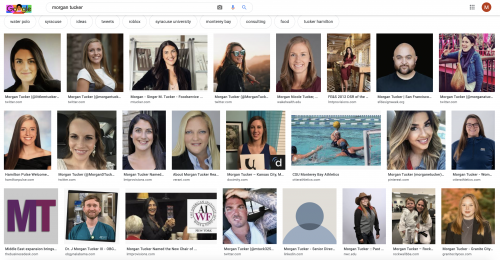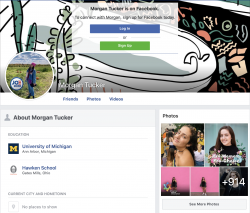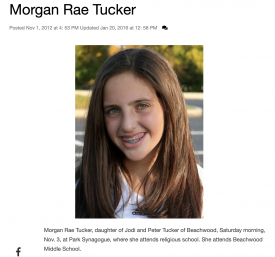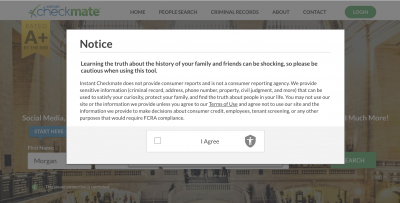Morgan Tucker
Contents
My Data Identity
I like to think of myself as a unique individual. But according to the web, I am not so unique. Well, at least my name is not. Though I feel confident with my identity, in the "infosphere", I am merely lost in the sea of Morgan Tuckers.
I am more relieved than upset to know I am not that easy to find online. Though it is comforting to know this, it is problematic the information that can be found about me does not paint an accurate picture of who I am. However, even if an abundance of information appears when searching my name, online information and data can never portray an accurate representation of my, or any person's, authentic self, as online information is only snippets of my life and are missing crucial pieces to the story that is me.
Online Presence History
Like all overprotective parents in the 2000s, my parents were extremely worried about me being online. They did not even want me having a Webkinz account. So when I was finally allowed to have an iPad, they made it clear that I was not allowed to get social media. Well, like any child of overprotective parents, I went against their wishes and secretly created Instagram and Twitter accounts. But I did follow one rule: never use my last name. So most of my accounts are under Morgan Tuck or Morgan T. I guess my parents had the right idea because this contributes to the difficulty in finding information about me with a simple search.
Who I am According to Google
search: 'morgan tucker'
Searching my full name in google search does not bring up anything directly related to me. However, two of the links that appear on the first page of results are Morgan Tuckers who are designers. I found this interesting because I am a graphic designer. I figured that Google was showing me Morgan Tucker designers because it knew I was a designer based on my frequent searches, so I decided to do the same search in an incognito window. To my surprise, the same results for my name showed up in the incognito window. At least when someone looks me up they can decipher I am a designer, even if the information is about a different Morgan Tucker.
The second link was a link to a LinkedIn search page of all of the Morgan Tucker’s with a LinkedIn account. I show up as the fourth result! Until the person searching adds me as a connection, they will only see my name as Morgan T. They also will not be able to see a profile picture, but they can read an article I wrote as well as see the posts I have liked on LinkedIn. They can also see my full name, even my middle name, in my header photo. My profile being the fourth result on LinkedIn is exciting to me because I have worked hard on catering my professional presence, however, it is unnerving that though my name only shows up as Morgan T for strangers, it shows up when Morgan Tucker is searched, so my last name can easily be inferred.
A search for Morgan Tuckers on Facebook is also on the first page further down the page. When I clicked on this, my actual Facebook page was the 78th result of the search. Some people who showed up before my page did not even have the first name Morgan or their last name was not Tucker. Though I am glad I am not easy to find, I am worried that when I am older, my long-lost college friends will not be able to find me on Facebook!
search: 'morgan tuck'
I had big hopes that this search would lead to most of my social media profiles because my username is almost always morgantuck11. However, the only person that showed up for every page of results was a WNBA player.
search: 'morgan tucker hawken'
I began to think I would have more luck by narrowing my search by including the name of my high school. The first link that appears is my Facebook page because I have my high school in my bio. When someone goes to my Facebook page and is not already my friend on Facebook, the first image they see is my profile photo which has a sticker that states I voted for Joe Biden. The second photo they see is an older profile picture with a sticker indicating I am pro-choice. This is the first instance of my investigation where I found pieces of my identity that tell a story of who I am. These photos with stickers show I am politically active and believe in fighting for reproductive rights, however, they do not show all of the hard work I have done to help encourage voter turnout and social change.This search also brought me to an archived article on my high school’s website. It discusses how I was selected to be a part of a youth panel for the Jewish Federation. The article does not explain what the youth panel does accurately. It states “Panelists are expected to commit to one Sunday per month, host an Israeli teen, travel to Israel, and lead a community project”, and all we were expected to do was commit to one Sunday a month. This is an instance where I do not have control over what is told about me and false information.
The search also leads to a page indicating that I received a bronze medal award for a Spanish test. I have since forgotten about all of the Spanish I learned, so this is no longer representative of me.
search: 'morgan tucker beachwood'
I decided to make my search even more specific by searching my name with my hometown, Beachwood. Beachwood City Schools is also the name of the school system I attended until high school. This search brought up my Bat Mitzvah announcement from 2012 in The Jewish News. The announcement says I attend Beachwood Middle School and contains outdated information. It also includes my middle name, my parents' names, and the synagogue I belong to.Concerns
I can gather from my online data my education history, some of my interests such as design and reproductive rights, and that I am Jewish. Though this is not much, it does scare me how much one can figure out about me after a little searching. Due to how much antisemitism exists in today's society, I often worry of strangers knowing I am Jewish. Tucker is not a Jewish last name, so on paper, I am not immediately known to be Jewish. But because many of my online persona indicates that I am Jewish and even states the synagogue I belong to, I feel unnerved because I have no clue who will end up with this information about me.
Who I am According to Checkmate
To see how much someone could find out about me in one place, I decided to look myself up on Checkmate. I had never looked myself on a data broker website, so I was unsure what to expect. As I tried to access files about myself, the website kept showing me warnings that some of the information I find may be surprising to read, and I had to check a box acknowledging this. I felt unsettled and nervous, hoping I wouldn't discover I was adopted or something.
I looked at as much as I could before it made me create an account. Checkmate knows my full name, my address, the types of online accounts, and my father, mother, and grandfather's name. Checkmate provided the most accurate yet basic portrait of me without having to do much digging. However, my true, authentic self has yet to be shown through my online persona.
Conclusion
Living in a world filled with social media, I have an intense desire to curate my presence online. This allows me to feel like I have some control in this uncontrollable world. Even though I put a lot of effort into my social media accounts to seem quirky, my Redbubble shop to seem professional, my art Instagram to show my art style, and my blog to seem authentic, I realized I still have little control of what someone on the web can gather about who I am. The information they would find is outdated and just a small part of who I am. To get to know the real me, you need to spend time with me, speak with me, and interact with me. Pixels on a screen do not portray the whole picture.
References
- Floridi, Luciano. Information and Computer Ethics. Cambridge University Press, 2010.





